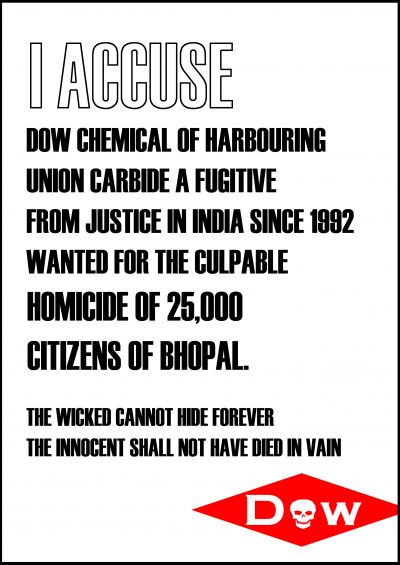
Thirty years ago today, a ‘settlement’ was made for the Bhopal Disaster. There was no consultation with its survivors. Union Carbide paid $470m dollars, which represented an absolute pittance when shared out among survivor, with most receiving only a few hundred dollars.
By the summer of 1988 pressure was building after a fourth summons to the Bhopal Disaster criminal case was issued to the Union Carbide Corporation and Warren Anderson, CEO at the time of the disaster. Robert Berzok, UCC’s then director of communications stated: “Union Carbide will not appear because, as a United States corporation, it is not subject to India’s jurisdiction”
Shortly after, the Bhopal Courts made a request to the United States administration seeking permission for India’s Central Bureau of Investigation to inspect safety systems installed at Union Carbide’s MIC unit at its pesticide plant in West Virginia. The plant was purported to be the ‘sister’ plant to the one in Bhopal but was believed to use different technologies.
Faced with Union Carbide’s intransigence, on 9th February 1989 the Chief Judicial Magistrate issued a non-bailable warrant of arrest against Warren Anderson for repeatedly ignoring summons. Just days later, on the 14th February, the U.S. Administration finally granted permission for the inspection of safety systems at the plant in West Virginia.
On the 15th February the matter of paying interim compensation was being heard at the Supreme Court of India, when a surprise announcement was made that Union Carbide had already reached a final settlement for the disaster with the Indian Government. The settlement stipulated that UCC would pay 470 million US dollars as compensation and the government would withdraw the criminal cases.
Significant public protest followed the settlement, along with the filing of various review and writ petitions by groups representing the survivors and, in October of 1991, the Supreme Court of India revoked the criminal immunity granted to UCC and the other accused.
After ignoring four court summonses, in February 1992 the Bhopal Chief Judical magistrate proclaims Anderson to be ‘absconding from justice’ (a fugitive from law). UCC (USA) and UCE (Hong Kong) are also proclaimed absconders.
But, for Union Carbide and current owner Dow Chemical, time froze thirty years ago on 15th February. They refuse to accept that the Indian courts have revoked the criminal immunity, as they are entitled to do, and that the cases have been reinstated. No official of the Union Carbide Corporation has faced trial and, since the 2001 takeover by Dow, no official from that corporation will explain this absence to the Bhopal Court despite being summoned to do so on multiple occasions.
Nor do Union Carbide and Dow accept the legitimate challenge to the $470m settlement from the Indian Government which filed, in 2010, a ‘curative petition’ aiming to: ‘cure the gross miscarriage of justice and perpetration of irremediable injustice being suffered by the victims of the Bhopal Gas Tragedy; It is submitted that the settlement compensation…. was based on certain factual assumptions which have been found to be completely incorrect and far removed from reality.’
In an article in The Independent a spokesperson for Union Carbide said the company had filed a response to the petition and “intends to vigorously defend itself”.
Curative Petition to get April hearing
Find out more about the court cases


